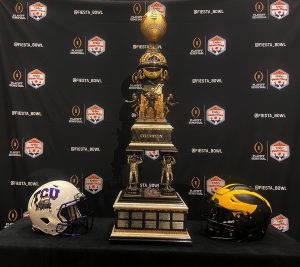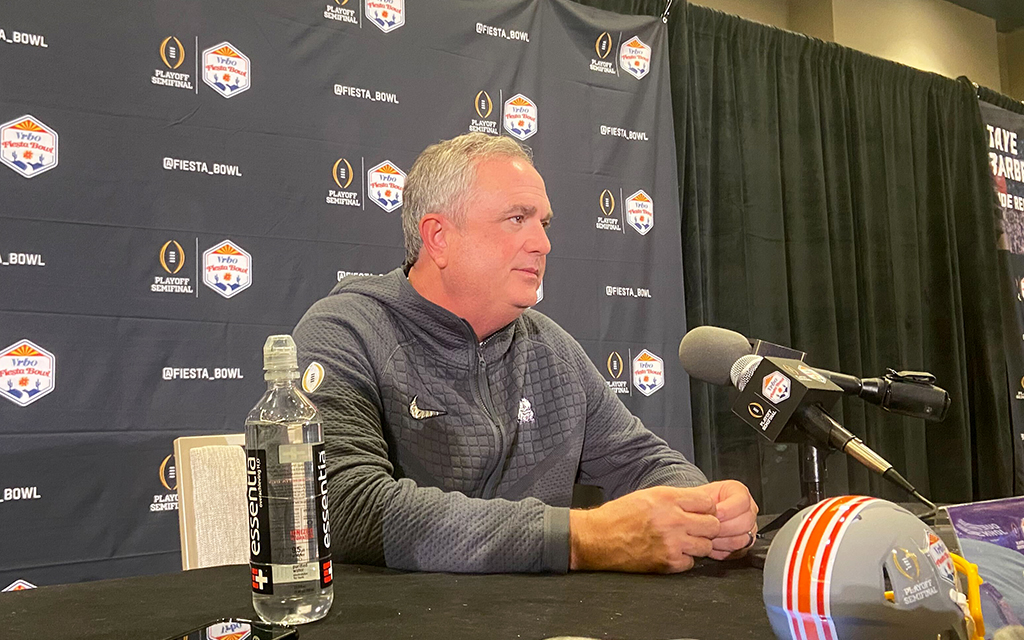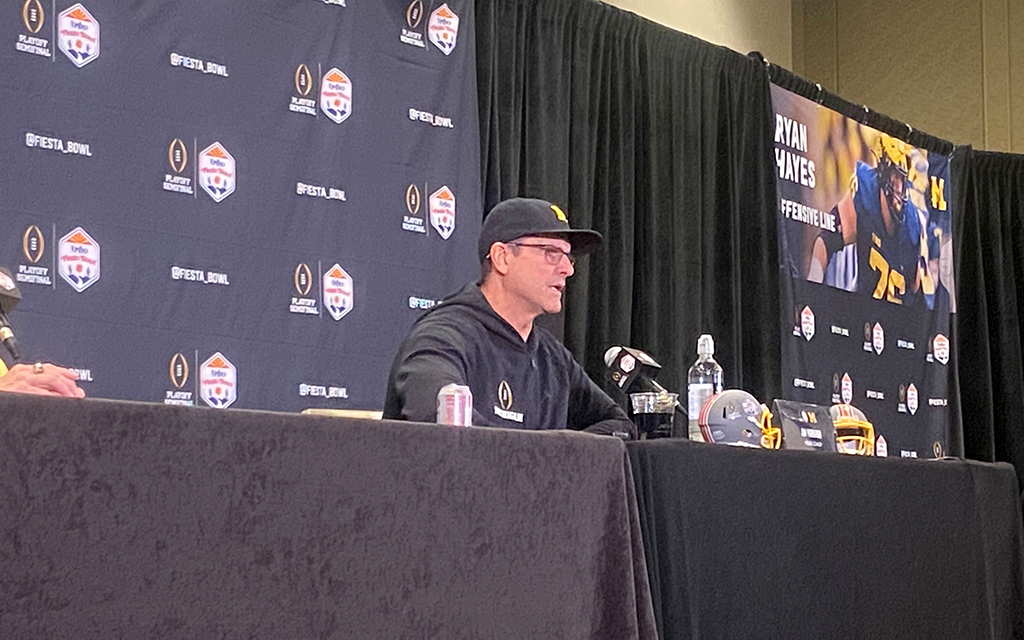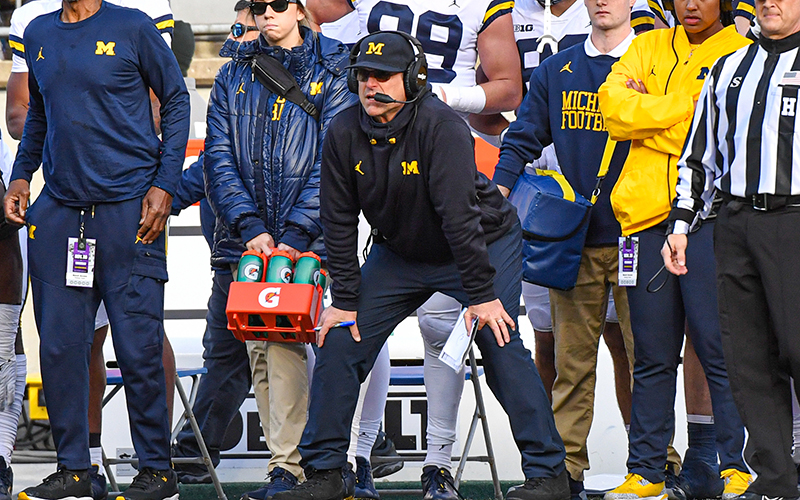SCOTTSDALE – The Fiesta Bowl’s third College Football Playoff semifinal is a battle between one of the sport’s most storied programs and one that surprised everyone en route to Arizona.
The No. 2 Michigan Wolverines and the No. 3 TCU Horned Frogs will play Saturday at State Farm Stadium in Glendale for a spot in the College Football Playoff national championship game in Los Angeles.
The winner of the Fiesta Bowl will play the winner of the Peach Bowl, either No. 1 Georgia or No. 4 Ohio State, for the title meeting Jan. 9.
Michigan was expected to be in the national conversation after a playoff appearance last season. Guided by coach Jim Harbaugh, the Wolverines are 13-0 and Big Ten Conference champions.
Harbaugh has experience in the Fiesta Bowl, leading Michigan to its only appearance in the game during his junior season. He ran for two short touchdown runs as part of a 24-point third quarter, leading the Wolverines to victory over Nebraska in the 1986 Fiesta Bowl.
“I remember it being a great experience and a winning experience,” Harbaugh said.
Expectations for TCU, meanwhile, were low. The program turned to Sonny Dykes after a 5-7 season last year.

The Fiesta Bowl trophy sits between TCU and Michigan helmets at the Fiesta Bowl media day Thursday in Scottsdale. The trophy winner will be determined Saturday at State Farm Stadium in Glendale. (Photo by Nicholas Hodell/Cronkite News)
Dykes delivered. The Horned Frogs went undefeated in the regular season and narrowly missed out on a Big 12 championship after a tough overtime loss against Kansas State in the Big 12 championship game.
Dykes has instilled confidence in the entire program, including his star, senior quarterback Max Duggan.
Duggan was not supposed to be the focal point for the Horned Frogs as redshirt freshman quarterback Chandler Morris started the team’s opening game against Colorado. A left knee injury to Morris, though, allowed Duggan to get playing time.
Transferring, something done by players frequently in college football’s current landscape, was not a thought in his mind.
“When I came here out of high school, I made a commitment,” Duggan said. “I want to be here for four years. I want to graduate from TCU.”
Duggan’s mindset, and availability to step in after Morris’ injury, paid dividends for the Horned Frogs as he exceeded expectations to be one of college football’s best players this season.
He threw for over 3,000 yards with 30 touchdowns in 2022. He won the Davey O’Brien Award, given to the nation’s top quarterback, and finished as the runner-up for the Heisman Trophy to USC quarterback Caleb Williams.
One of his wide receivers, senior Taye Barber, said he knew from Duggan’s arrival in 2019 that he would be an exceptional quarterback.
“I knew what he was when he first came here as a freshman,” Barber said. “He came here early in the spring. He was making big boy throws that I haven’t seen before. So, I kind of knew he was going to turn into what he is today.”
His running ability is something Michigan defenders are prepared for in addition to his passing game.
“I don’t think we saw (anyone) as physical of a runner as Max Duggan,” said senior defensive lineman Mazi Smith. “I think that when he lowers his shoulder, he brings a lot of power behind that. He isn’t messing around.”
On the other side, Michigan sophomore J.J. McCarthy is a poised quarterback who can find his receivers well. He is in top form with three touchdown passes in the last regular season game at Ohio State and in the Big Ten championship game.
Harbaugh said his quarterback has the traits necessary to be effective.
“The kid’s got it all,” Harbaugh said. “(He has) tremendous talent, athleticism, work ethic and the willingness to put the team as the highest priority, and I think every one of his teammates knows that. It’s never all about J.J.”
However, this year’s Michigan team is more run-oriented, as both sides of the ball are nationally elite in that area.
The Wolverines have a run-first offense, one that is led by junior running back Blake Corum and sophomore running back Donovan Edwards. Michigan ranks fifth in the nation with 243 rushing yards per game.
When Corum missed the Big Ten championship game against Purdue due to a season-ending knee injury, Edwards became the star with a career-high 25 carries for 185 yards and a touchdown, earning the game’s most valuable player award.
He said the work he put in never changed throughout his time at Michigan, where he has usually been a second or third string player.
“It’s been my preparation to prepare like I’m running back one,” Edwards said. “I’ve been preparing myself all year to be running back one.”
Michigan’s defense is also a major strength, with the Wolverines placing in the top five nationally with 13.4 points allowed per game.
Michigan’s run defense is especially potent, allowing just 85.2 rushing yards per game, good for third nationally. Only five teams have put up more than 100 rushing yards in a game against the Wolverines, with none of them managing more than 150 rushing yards.
Smith said his unit looks to play fundamental football as well as it can.
“I think that when you just break it down, we talked about hands, hips and feet,” Smith said. “We talked about finishing in the dominant position in every play. We talked about putting it all together and being explosive.”
He also said TCU will give Michigan a big challenge up front.
“They do all of the things that a Big Ten branded team does,” Smith said. “They just do it really well and that’s why they are the third team and in the College Football Playoff.”



